


This article highlights ten essential medications that play a crucial role in effectively treating Deep Vein Thrombosis (DVT). Among these, anticoagulants such as Rivaroxaban, Apixaban, and Dabigatran stand out, alongside supportive treatments like compression stockings. Understanding the mechanisms of action for each medication is vital, as it allows us to appreciate their benefits and the considerations necessary for specific patient populations, especially the elderly.
As we explore these medications, it’s important to recognize that each patient is unique. Tailored treatment plans can significantly enhance comfort and health outcomes. For instance, the choice of medication may depend on individual health conditions and preferences. This personalized approach not only addresses the medical needs but also reassures patients that their well-being is at the forefront of care.
Furthermore, the importance of discussing these options with healthcare providers cannot be overstated. Patients are encouraged to voice their concerns and ask questions about their treatment plans. This dialogue fosters a supportive environment where patients feel valued and understood.
In conclusion, navigating the complexities of DVT treatment can be daunting, but the right support and information can make a difference. By focusing on tailored treatments and open communication, we aim to provide comfort and improve health outcomes for all patients, especially the elderly who may feel anxious about their health.
Managing Deep Vein Thrombosis (DVT) can feel overwhelming, especially when faced with the many treatment options available today. It's natural to have concerns about your health, but it’s comforting to know that advancements in medical science have provided patients with a variety of medications designed to not only prevent complications but also to promote recovery. However, you might wonder: how do these medications differ in effectiveness, safety, and suitability for your unique needs?
In this article, we will explore ten essential DVT medications, discussing their unique benefits and considerations. Our goal is to help you and your caregivers make informed decisions on your health journey, ensuring that you feel supported every step of the way.
At Amavita Heart and Vascular Health®, we understand that managing Deep Vein Thrombosis (DVT) can be a daunting experience. That's why we provide a thorough strategy that focuses on customized care plans tailored to the unique needs of each individual. Our team, led by an experienced geriatric cardiologist, merges advanced medical techniques with compassionate care, ensuring that you receive the best possible outcomes.
We emphasize the importance of early detection and intervention in managing DVT. By utilizing a range of medications and therapies, we aim to effectively prevent complications and support your health journey. This patient-centered approach is particularly beneficial for elderly populations, who may face additional challenges in managing cardiovascular health.
You are not alone in this. We are here to support you every step of the way, offering understanding and guidance as you navigate your health concerns. Together, we can work towards a healthier future.
Rivaroxaban (Xarelto) is a leading anticoagulant that can significantly help in the treatment of deep vein thrombosis (DVT) and is classified among the effective DVT medications. It works by gently inhibiting Factor Xa, a crucial part of the blood clotting process. This action not only prevents the formation of new clots but also allows existing ones to dissolve, promoting better health. One of the wonderful benefits of Rivaroxaban is that it is taken orally, which can make it easier for you to stick to your treatment plan.
Furthermore, it does not require regular monitoring of INR levels, which can be a relief for many individuals. This convenience is particularly beneficial for elderly patients who may find frequent blood tests challenging. It’s important to know that with Rivaroxaban, you have a supportive option that prioritizes your comfort and well-being. If you have any concerns or questions about your treatment, please don’t hesitate to reach out for support. Your health journey matters, and we are here to help you every step of the way.
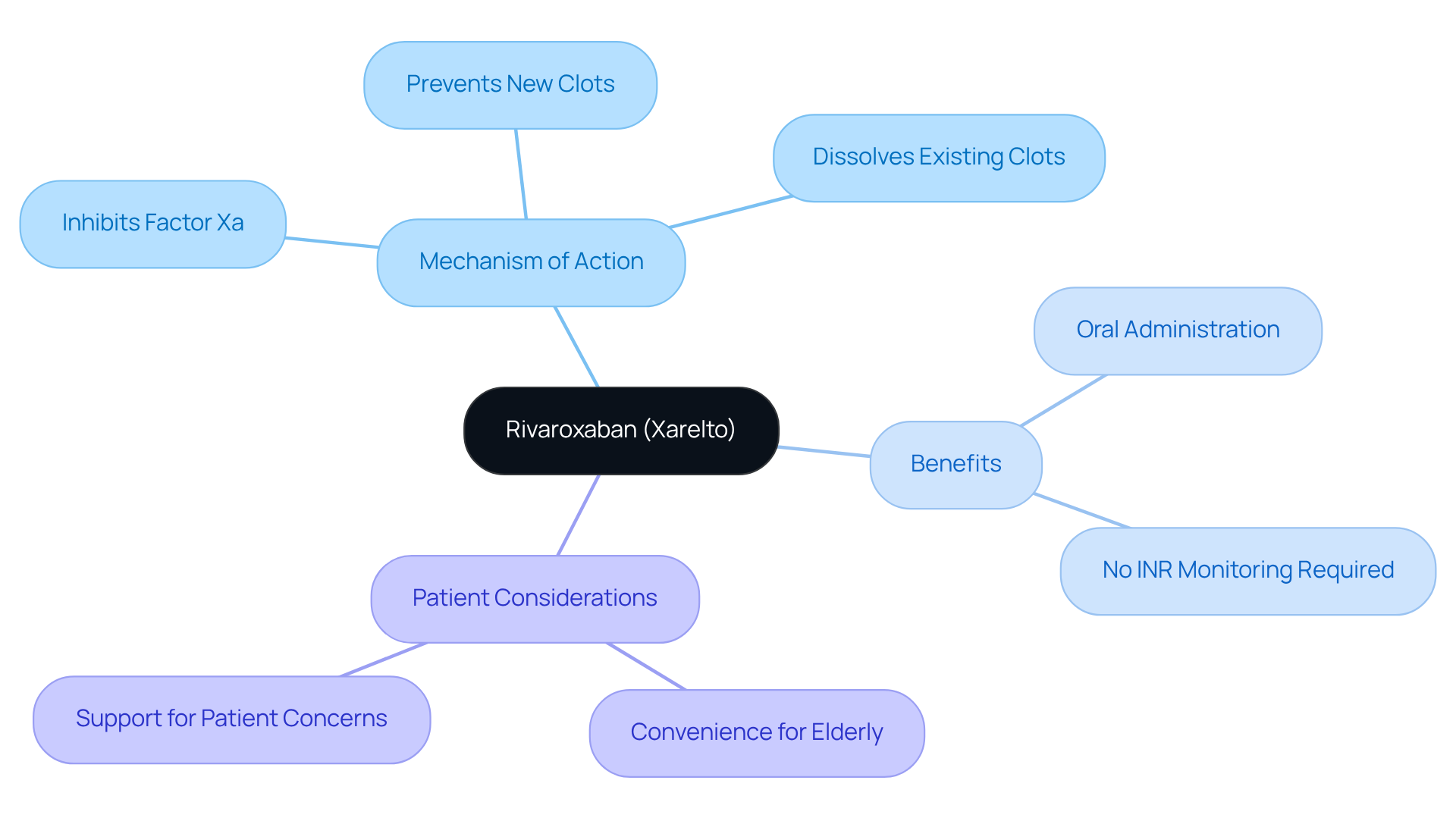
If you or a loved one are dealing with deep vein thrombosis (DVT), it’s natural to have concerns about DVT medications as treatment options. Apixaban, commonly known as Eliquis, is a safe and flexible choice among DVT medications that many patients find reassuring. This medication is recognized for its effectiveness and has a lower risk of bleeding compared to traditional anticoagulants, which can be a significant relief for those worried about side effects.
Apixaban works by directly inhibiting Factor Xa, similar to Rivaroxaban, but what truly sets it apart is its dosing flexibility. This means that the medication can be adjusted to meet individual needs, which is particularly beneficial for older adults who may have varying levels of renal function. It’s important to feel that your treatment is tailored just for you.
Moreover, studies have shown that Apixaban is one of the effective DVT medications that can reduce the chance of recurrent DVT, making it a dependable option for long-term management. This can provide peace of mind as you navigate your health journey. Remember, you are not alone in this; there are options available that prioritize your well-being. If you have any questions or need support, don't hesitate to reach out to your healthcare provider.
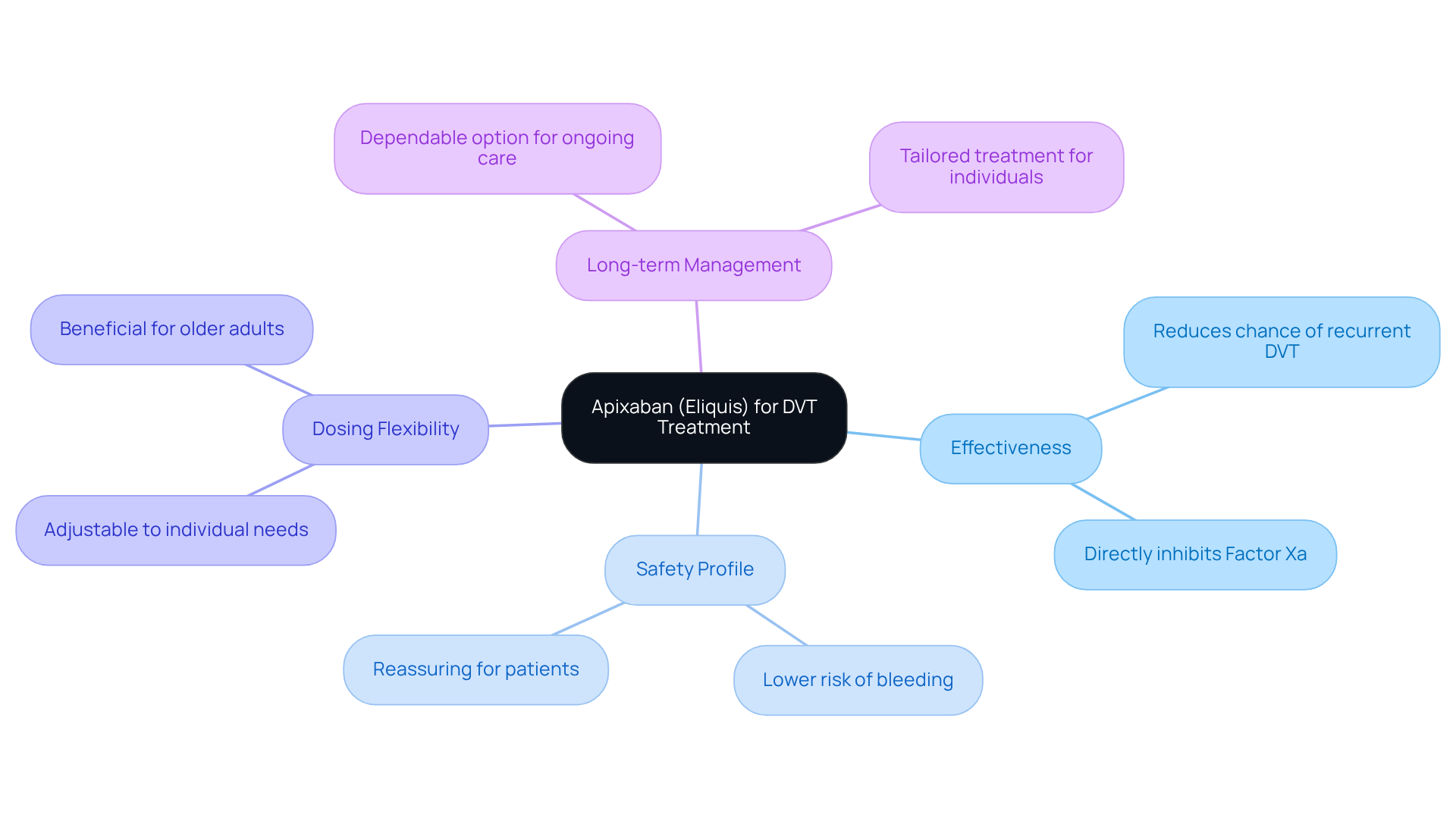
Dabigatran (Pradaxa) is a direct thrombin inhibitor that offers a compassionate alternative for treating deep vein thrombosis (DVT). By directly inhibiting thrombin, Dabigatran prevents the conversion of fibrinogen to fibrin, which is a crucial step in clot formation. This medication is taken orally and, like Rivaroxaban and Apixaban, does not require routine monitoring, making it easier for patients to manage their treatment.
However, it’s essential to be aware that Dabigatran may carry a higher risk of gastrointestinal bleeding, especially in older individuals. This consideration is important when discussing treatment options with your healthcare provider. Overall, Dabigatran is a valuable option for those who may benefit from its unique action, and it’s worth discussing with your doctor to see if it’s right for you. Remember, your health and comfort are the top priorities, and there are supportive options available to help you manage your condition effectively.

Edoxaban (Savaysa) offers a promising treatment option for those dealing with DVT, as it works by inhibiting Factor Xa. Many patients may feel overwhelmed by their condition, and it's important to highlight that Edoxaban features a convenient once-daily dosing schedule, which can significantly enhance compliance. Studies have shown that DVT medications are as effective as traditional anticoagulants, but they carry a lower risk of bleeding complications, providing peace of mind for patients and their families.
Before starting Edoxaban, assessing renal function is crucial, as kidney health can impact its efficacy. This consideration makes it a suitable choice for many older individuals who may experience varying degrees of renal function. If you or a loved one are concerned about how this medication may fit into your health journey, please know that support is available. Reach out to your healthcare provider to discuss your options and ensure you receive the care you deserve.
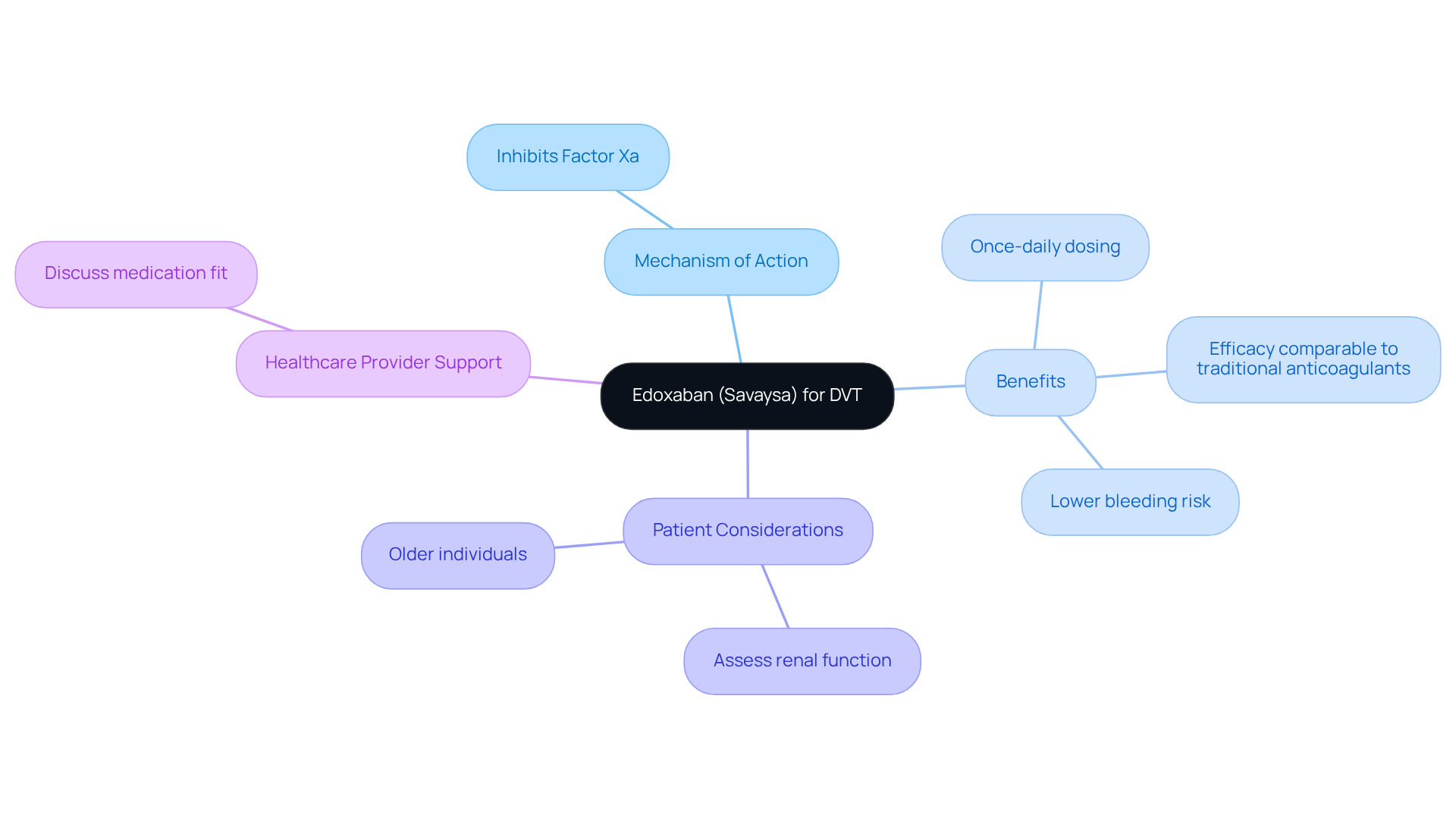
Fondaparinux Sodium (Arixtra) is an injectable anticoagulant that plays a vital role in the acute management of DVT medications for deep vein thrombosis (DVT). This medication works by selectively inhibiting Factor Xa, an essential component in the coagulation cascade, and is administered via subcutaneous injection. One of its most reassuring features is its predictable pharmacokinetic profile, which allows for fixed dosing without the need for routine monitoring. This makes it especially beneficial in hospital settings where rapid anticoagulation is crucial for patient safety and recovery.
Research indicates that Fondaparinux is one of the effective DVT medications for achieving DVT resolution, boasting a significant success rate of 71.3% in individuals treated postoperatively. Emergency medicine specialists emphasize its simplicity and safety characteristics, highlighting its lower occurrence of bleeding compared to conventional heparins, along with a reduced likelihood of thrombocytopenia at 3.5%. These factors make Fondaparinux a preferred choice among DVT medications for prompt DVT management, particularly for older individuals who may be more vulnerable to complications.
Fondaparinux is approved in both Europe and the US for treating acute venous thromboembolism (VTE), including DVT and pulmonary embolism (PE), which further solidifies its acceptance in clinical practice. Overall, Fondaparinux represents a valuable option in the category of DVT medications, combining efficacy with practical administration protocols. However, it is essential to carefully select individuals for this treatment and time the intervention appropriately to mitigate potential risks, including hemorrhagic complications associated with high-dose therapy.
If you or a loved one are facing concerns about DVT, know that there are effective options available, and seeking support can make a significant difference in your care journey.
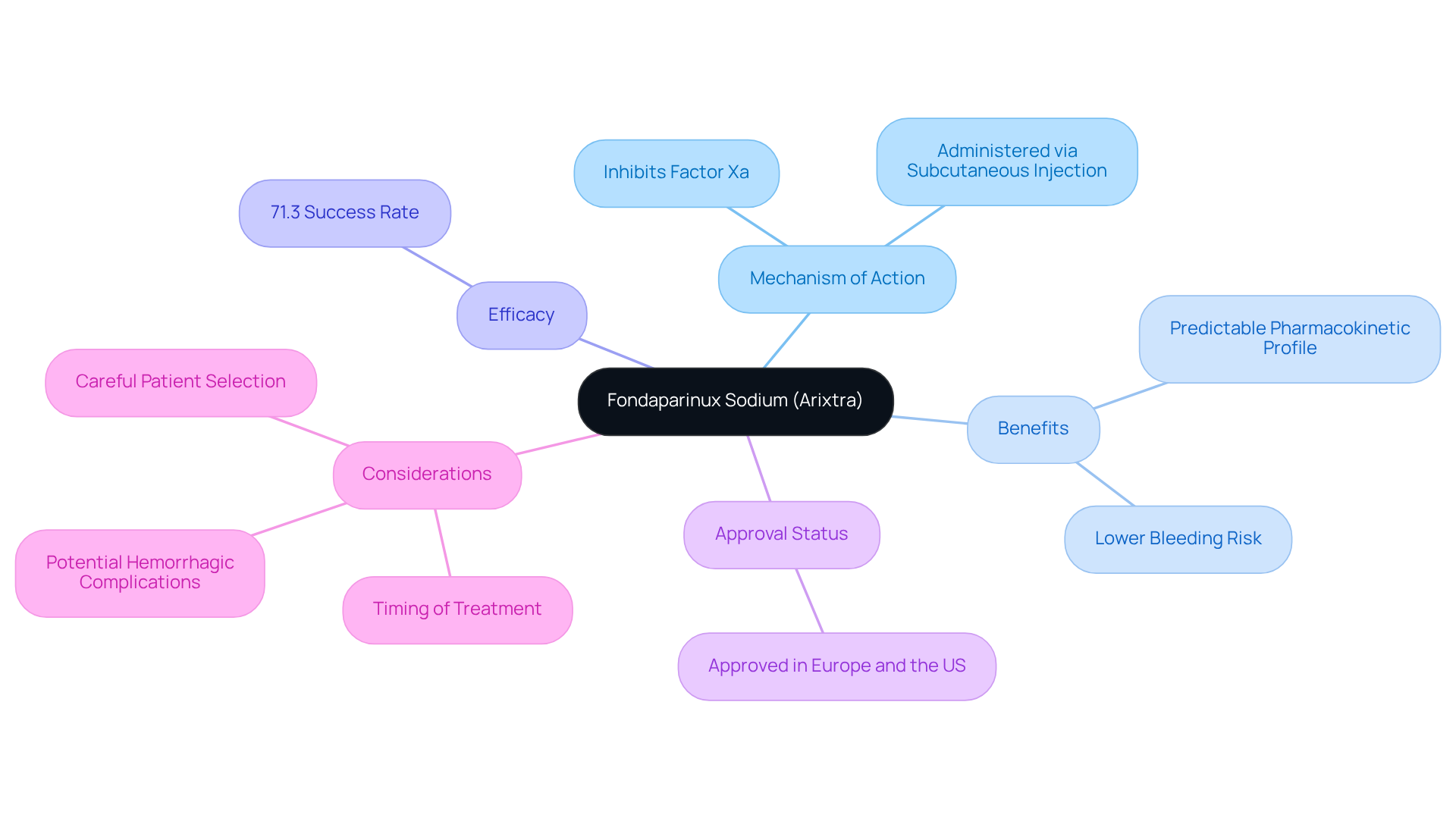
Low-Molecular-Weight Heparins (LMWH), such as Enoxaparin (Lovenox), are important DVT medications that have played a crucial role in managing Deep Vein Thrombosis (DVT) for many years. Have you ever wondered how these medications work? They inhibit Factor Xa and thrombin, providing effective anticoagulation that helps keep you safe. Administered via subcutaneous injection, LMWH is often preferred due to its ease of use and predictable pharmacokinetics, making it a suitable option for many patients.
This is especially beneficial for senior individuals who may require close observation and personalized dosing. It's comforting to know that LMWH is one of the DVT medications with a well-established safety profile and is effective in preventing the recurrence of DVT. If you or a loved one are concerned about DVT, consider discussing LMWH with your healthcare provider. Remember, you are not alone in this journey, and there are effective treatments available to help you feel secure and cared for.

Warfarin (Coumadin) has been a trusted anticoagulant among DVT medications for the treatment and prevention of DVT for many years. It works by inhibiting vitamin K-dependent clotting factors, crucial for blood coagulation. While it can be effective, we understand that Warfarin requires regular monitoring of INR levels, which can be particularly challenging for elderly individuals. Additionally, dietary interactions and the need for consistent medication adherence may complicate its use.
Despite these challenges, many patients can still benefit from DVT medications such as Warfarin, especially those who may not be suitable candidates for newer anticoagulants. It’s important to have open discussions with your healthcare provider about your concerns and to explore all available options together. Remember, you are not alone in this journey, and support is always available to help you manage your health effectively.
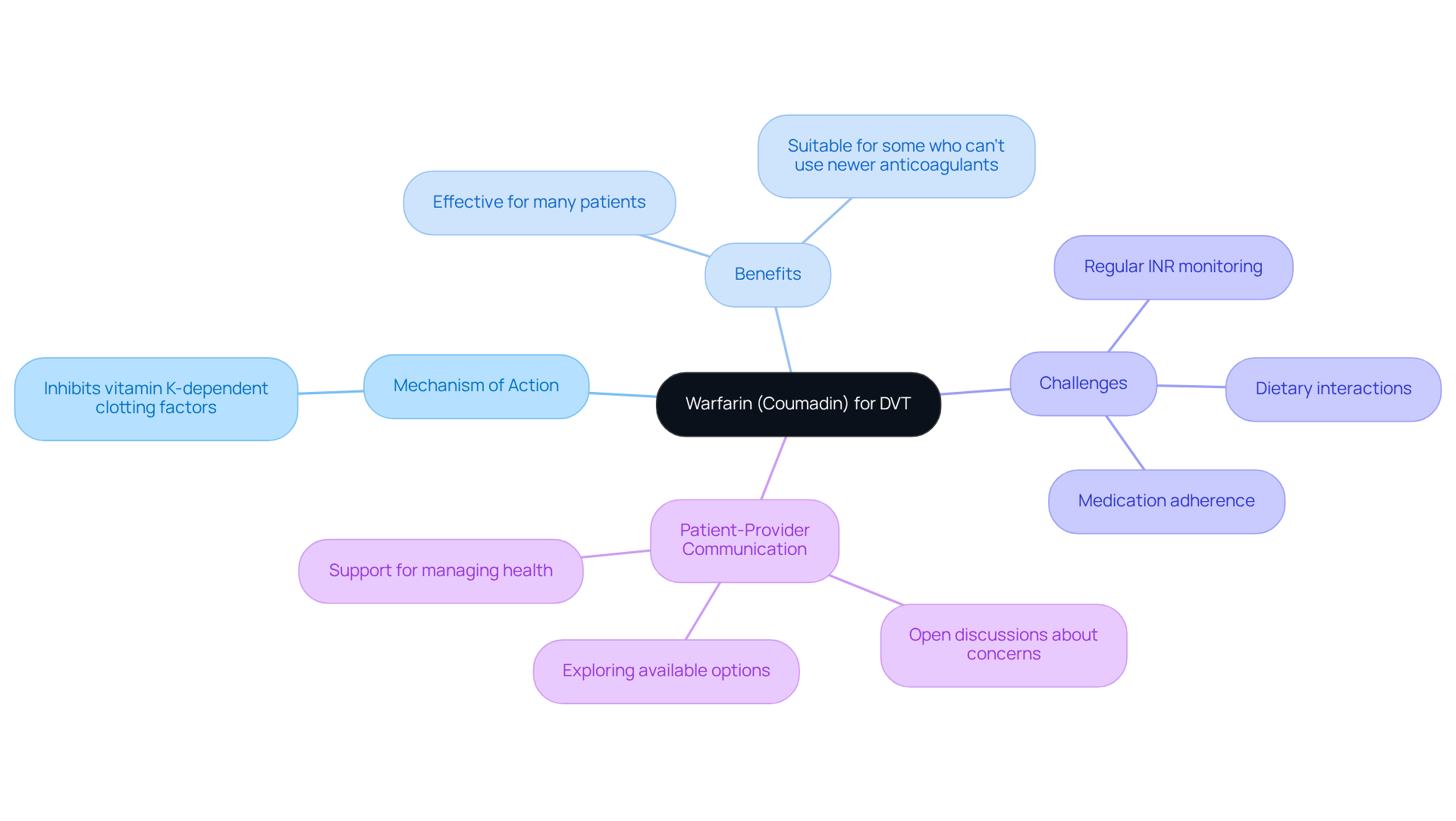
Thrombolytics are powerful DVT medications designed to quickly resolve severe deep vein thrombosis (DVT), especially when there is a heightened risk of complications such as pulmonary embolism. These agents work by swiftly dissolving blood clots, restoring blood flow to the affected areas. However, their use is typically reserved for serious situations due to significant risks, especially concerning bleeding. For older individuals, who often face additional health challenges, the decision to administer thrombolytics requires careful consideration of current health issues and potential drug interactions.
While thrombolytics can be life-saving and greatly enhance outcomes when used appropriately, it is crucial to thoroughly assess each individual's overall health status. Statistics indicate that older adults face a higher likelihood of bleeding when treated with thrombolytics, with research showing that the incidence of major bleeding can reach as high as 10% in this demographic. Nevertheless, real-world experiences reveal that, when used judiciously, DVT medications and thrombolytic therapy can lead to significant improvements in recovery and quality of life for older adults suffering from severe DVT.
As Dr. Angela A Kokkosis, a vascular expert, wisely notes, 'The advantages of thrombolytics should be thoroughly considered in relation to the dangers, particularly in elderly individuals who might have various health concerns.' Therefore, it is essential for healthcare providers to weigh the benefits against the risks in this population, ensuring that both individuals and their caregivers are well-informed about the available options. Remember, seeking support and guidance can make a meaningful difference in navigating these decisions.
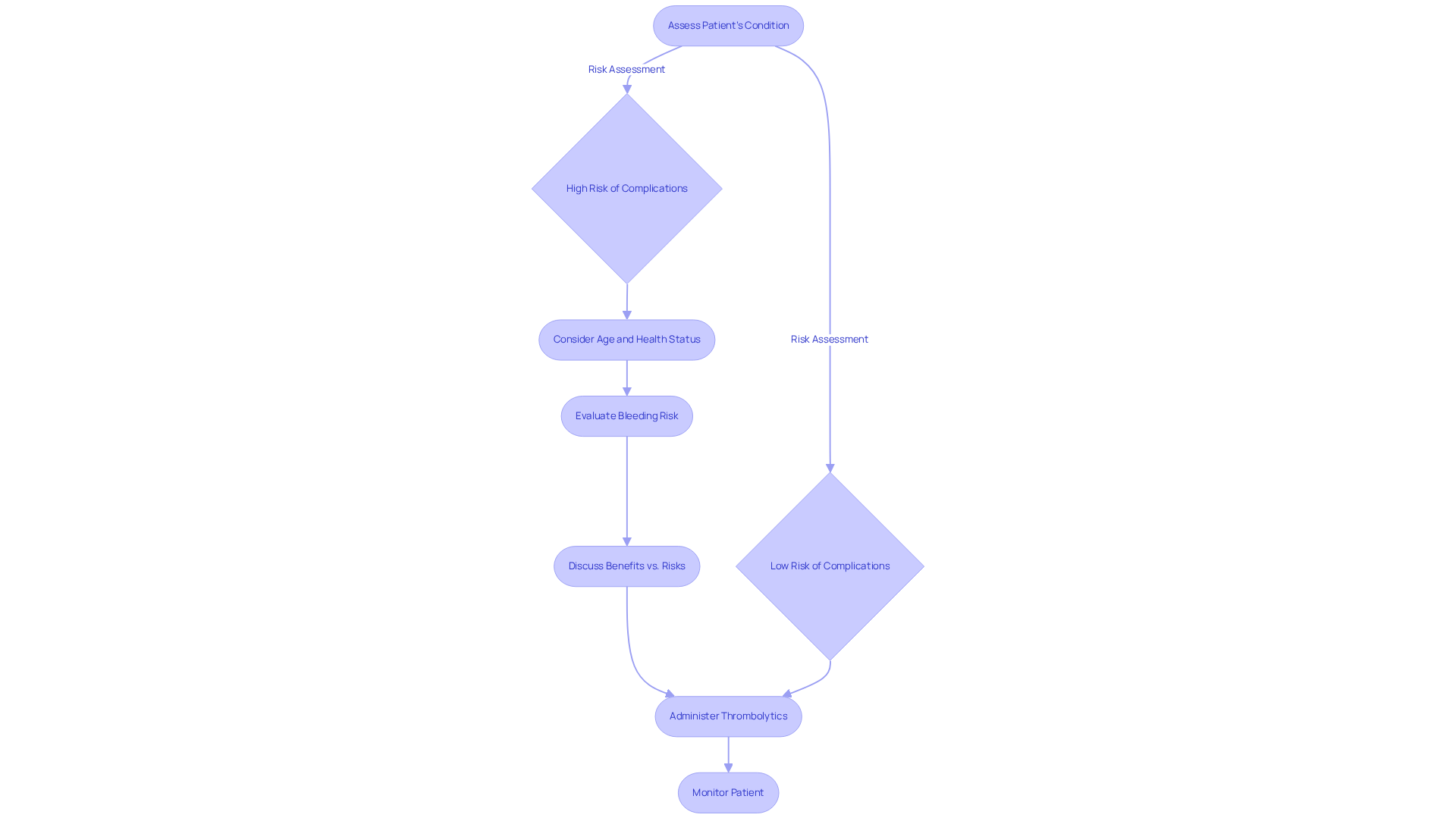
Compression stockings play a vital role in your recovery from DVT, offering graduated compression that enhances venous return and alleviates swelling. If you’re on the path to healing, you might find these stockings particularly beneficial, as they not only help prevent the recurrence of clots but also ease discomfort such as pain and swelling.
Many healthcare professionals recommend compression therapy alongside DVT medications, creating a holistic approach to managing DVT. For elderly patients, wearing compression stockings can significantly improve comfort and mobility during recovery, making them an invaluable part of your treatment plan.
Remember, you are not alone in this journey; support is available to help you every step of the way.

Managing Deep Vein Thrombosis (DVT) requires a thoughtful and compassionate approach that combines effective medications with personalized care strategies. This article highlights a range of essential DVT medications, including:
Each medication brings unique benefits and considerations, ensuring that patients have access to tailored treatment options that prioritize their health and comfort.
It's important to recognize the value of early detection and intervention. Supportive therapies, such as compression stockings, play a vital role in enhancing recovery. The various medications mentioned not only help prevent clot formation but also cater to the specific needs of different patient populations, particularly the elderly, who may face additional challenges in managing their health.
Ultimately, understanding the landscape of DVT treatment options is crucial for patients and their caregivers. By exploring these medications and engaging in open discussions with healthcare providers, individuals can make informed decisions that align with their health goals. Seeking guidance and support throughout this journey can significantly impact the management of DVT, leading to improved outcomes and a better quality of life. Remember, you are not alone in this; support is available to help you every step of the way.
What is Deep Vein Thrombosis (DVT) and why is it important to manage it?
Deep Vein Thrombosis (DVT) is a condition where blood clots form in deep veins, often in the legs. Managing DVT is crucial to prevent complications and support overall health, especially for elderly populations who may face additional cardiovascular challenges.
What approach does Amavita Heart and Vascular Health take in managing DVT?
Amavita Heart and Vascular Health provides a comprehensive strategy that includes customized care plans tailored to each individual's needs. The team focuses on early detection and intervention, utilizing a range of medications and therapies to effectively manage DVT.
Who leads the team at Amavita Heart and Vascular Health?
The team is led by an experienced geriatric cardiologist who combines advanced medical techniques with compassionate care to ensure optimal patient outcomes.
What is Rivaroxaban (Xarelto) and how does it help in treating DVT?
Rivaroxaban (Xarelto) is a leading anticoagulant medication that helps treat DVT by inhibiting Factor Xa, preventing new clot formation and allowing existing clots to dissolve. It is taken orally and does not require regular INR monitoring, making it convenient for patients.
What are the benefits of using Rivaroxaban for DVT treatment?
The benefits of Rivaroxaban include its oral administration, lack of need for regular blood tests, and its effectiveness in treating DVT while prioritizing patient comfort and well-being.
What is Apixaban (Eliquis) and how does it differ from other DVT medications?
Apixaban (Eliquis) is another effective anticoagulant for DVT that directly inhibits Factor Xa. It is recognized for its lower risk of bleeding compared to traditional anticoagulants and offers dosing flexibility, making it suitable for older adults with varying renal function.
How does Apixaban support long-term management of DVT?
Studies have shown that Apixaban can reduce the chance of recurrent DVT, making it a dependable option for long-term management and providing peace of mind for patients.
What should patients do if they have concerns about their DVT treatment?
Patients are encouraged to reach out to their healthcare provider for support and to discuss any concerns or questions regarding their DVT treatment options.